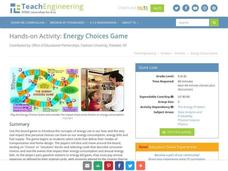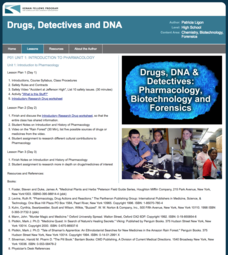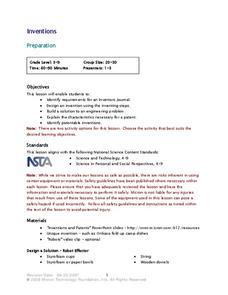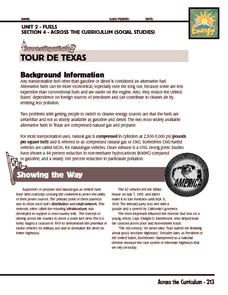DiscoverE
Coding Without Computers
See what it feels like to be a robot. Scholars use programming vocabulary to program a human robot and test out their codes by acting them out. The code should result in stacking six cups into a pyramid.
DiscoverE
The Power of Graphene
When you think electric circuits, your pencil probably isn't the thing that comes to mind. A simple experiment lets learners test whether the graphene in pencil lead is a conductor or an insulator. If the LED bulb lights up, a conductor...
Teach Engineering
Energy Choices Game
Here's a fun game on a very serious matter. Scholars play a board game to learn about personal energy use and consumption. They see how various choices affect their energy use and costs, and then apply this knowledge to brainstorm ways...
Kenan Fellows
Making Connections with Water Quality
What's in your water? And, why is water quality so important? Enhance your class's level of water appreciation through a lesson that demonstrates the necessity of water quality. Environmental enthusiasts explore the EPA's Clean Water...
Kenan Fellows
Analyzing Speed from Different Modalities
Show us your moves. Using sensor equipment, scholars track the motion of different movements, such as jogging, skipping, or jump roping. They analyze velocity and acceleration and create graphs representing each movement.
Kenan Fellows
Unit 1: Introduction to Pharmacology
Learn about the study of medications, including those found in nature and those made synthetically. The first of four lessons in a series on pharmacology includes lectures, hands-on experiments, research, and more.
Open Oregon Educational Resources
Manufacturing Processes 4-5
No need to manufacture an excuse for learning about manufacturing. Scholar use an eBook to study manufacturing processes. The textbook covers milling machines, lathe machines, drill presses, bandsaws, surface grinders, heat treating,...
Curated OER
A Good Foundation
Students examine how regional geology affects bridge foundations. In this physical science lesson, students explore how bridge types are constructed for different purposes.
Curated OER
You Are What You Drink!
Students explore water treatment systems. In this water conservation ecology lesson plan, students identify and explain several processes used for water treatment and define related vocabulary after listening to content information given...
Curated OER
Inventions
Students study invention steps and design their own invention. In this invention lesson, students discuss inventions and the process of inventing. Studnets write in an inventor's journal and study various types of inventions. Students...
Texas State Energy Conservation Office
Investigation: Tour de Texas
Teams of Texas tourists gather into groups to analyze what they can do with $50 worth of an alternative fuel. They write checks, keep a balance sheet, and map out their sight-seeing route taking into consideration the location of...
University of Minnesota
Mirroring Emotions
Do you ever give your class the "teacher look"? Without saying a word, they become silent and engaged (hopefully). How do they know what you're thinking? Explore the concept of nonverbal communication and how it relates to our mirror...
Curated OER
Science Week 2006
Students read these news reports: Science is hard and dull says kids, and PM behind Science Week campaign. They then discuss that the news stories show two sides of the public image of science in the UK. The teacher explains that...
Curated OER
Creating The Virtual Model
Students engage in a lesson that is about the concept of earthquake design. The lesson includes the integration of technology and how it can be used to create buildings and structures for withstanding an earthquake. Students also define...
Curated OER
The Air We Breathe
Students discover the cuases of pollution. They investigate different pollutants that exist. Stsudents research technologies developed by engineers to reduce the amounts of air pollution. Upon completion of assigned activities,...
Curated OER
Simple Machines: Levers
Students discover the fundamentals and daily applications of simple machines. They practice basic engineering theory through their hands-on demonstrations of levers.

















